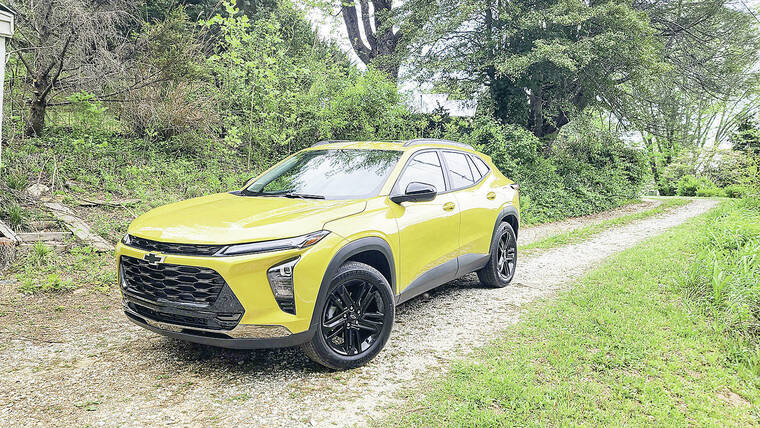Auto sales ‘24: The market’s biggest winners, losers and movers (so far)
Like a game of Twister, the auto industry is stretched in all different directions these days.
Manufacturers must pump out popular, internal-combustion vehicles to meet customer needs even as they satisfy government demands for electric vehicle sales. American consumers love big SUVs, but high gas prices and interest rates demand smaller cars. And automakers are keen to sniff out the latest enthusiast trends even as they commoditize vehicles on common platforms to save dollars.
Six months into the 2024 model year, we have sales data. Here are the latest winners, losers and trendsetters.
The best sellers
The Top Ten models have remained largely the same since 2023 with one exception. America’s perennial best-seller, the Ford F-150 pickup, leads the way, followed by: 2) Chevy Silverado 3) Toyota RAV4 4) Tesla Model Y 5) Honda CR-V 6) Ram 1500 7) Toyota Camry 8) Nissan Rogue 9) Honda Civic and 10) GMC Sierra.
Left out? The Jeep Grand Cherokee dropped from the Top Ten to #12 after a 15% sales decline — representative of a tough six months for the brands of Stellantis NV.
The bottom dwellers
Big luxury sedans, hydrogen cars, electric vehicles and sports cars are the market’s basement furniture. Manufacturers have predicted for three decades that hydrogen power is the fuel of the future, but model intros have been few and focused on California, where they generate big regulatory credits. The Hyundai Nexo was the lowest-selling vehicle in the United States through June with 77 units sold, while the Toyota Mirai was the fourth=worst at 245 units.
The wee Fiat 500 has been reborn as a fashionable, big city electric commuter (plug it in, go to work) — so its 203 unit sales (second to last) are no surprise. Sleek sedans have fallen from favor, even among luxury buyers. The Audi A7, Audi A8, Volvo S90/V90 wagon and Genesis G90 all struggled for sales in the Bottom Ten.
Most mainstream brands have kicked big sedans to the curb and the VW Arteon (the 12th-worst seller at 923 units) is being discontinued after the 2024 model year. Sports cars are brand halos but sales laggards and the BMW Z4 (13th worst) and Nissan GT-R (2nd worst) anchor the segment.
The biggest movers
With average vehicle transaction prices hovering near $50k and interest rates over 7%, consumers seem to be downsizing to entry-level segments. Chevy’s stylish, remade, $21.5k Trax subcompact received rave reviews in the media — and in the showroom. Trax sales are up 230%, rocketing it to the best-selling vehicle in its class at 90,462 units so far this year. It’s not alone.
Other affordable subcompacts SUVs have also gained strength, including the Honda HR-V (up 41%), Toyota Corolla Cross (up 59%) and Mazda CX-30 (+33%). Even in the luxury subcompact class, the class-leading, $41k BMW X1/X2 gained a whopping 500% in sales.
The trend continued in compact sedans, a segment that the Detroit Three automakers have abandoned. The class-leading, $25k Honda Civic gained 38% to 129,788 units sold while runner-up Toyota Corolla gained 25%. VW’s compact Jetta and Golf siblings were up 107% and 62%, respectively.
Compact pickups are a class of one, but the $25.5k Ford Maverick maintained the affordability trend with a 113% gain to 90,375 units.
The biggest losers
It’s been a tough year for some market icons. While the Civic and CR-V SUV (up 20%) have excelled, the Honda Accord has lost nearly 20% in sales even after the introduction of an all-new model. Despite price cuts, Tesla Model 3 sales slowed 40% — in part due to the continued success of its Model Y SUV stablemate, but also because other EVs have come to market (more on that later). It’s also suffering in an SUV-made market where the Tesla Model S (off 50%) and Kia K5 (-59%) also took big hits.
Jeep’s iconic Wrangler lost 9% of sales, leading a Stellantis rout. All Jeep models lost sales over a year ago with the exception of the all-new Wagoneer and Grand Wagoneer mega-utes, which roared out of the gate and appeared to steal sales from their GM and Ford competition. Dodge suffered as its Challenger and Charger icons rode into the sunset, and even the mighty Ram pickup saw sales decline 20%.
EV sales
Tesla’s cooling numbers are consistent with the EV segment as a whole, which has stalled at 8.4% of the market, according to JD Power. Tesla still accounts for just over 50% of sales, but the feds’ $7,500 cash on the hood for new EV transactions has helped close the gap between EVs and their legacy-brand, gas-powered peers.
Mustang Mach-E sales accelerated by 58% through June to 22,234 units, while the Cadillac Lyriq got its act together and pumped out 13,094 units — a whopping 465% increase over a year ago. Volkswagen has touted the ID.4 EV as its most important vehicle since the Bug, but its sales were squashed by 28% to just 11,857 units.
Other mainstream brands were more successful, with the Toyota bZ4X hitting 9,468 sales (a 159% bump) and the Nissan Ariya up 80% (9,346 units). The biggest gainer? The $100k GMC Hummer Pickup/SUV sold 4,598 units for a 6,974% jump.
Pickup wars
Even as the redesigned, hybrid Toyota Tundra gained a healthy 31% in sales, its six-month 78,454 unit tally is about what Ford F-Series sells in a month. The tables are turned in the midsize segment, where the Toyota Tacoma has long dominated.
But with the switch-over to the new-generation Tacoma at its Mexican assembly plants, Toyota has opened the door for competitors. Tacoma sales plummeted from 116,845 to 69,437 (a 41% drop), which has benefited the Chevy Colorado/GMC Canyon dynamic duo which saw sales rise 30% (to 58,658 units). The Nissan Frontier also sold 39,964 units — a 17% gain.
American muscle
The Ford Mustang is the last pony car standing as the Chevrolet Camaro and Dodge Challenger coupes have been sent out to pasture. Still, leftover ‘23 Challenger sales showed the badge’s resiliency — moving 21,216 units, just shy of the Mustang’s 27.4k sales.
And despite a $68k sticker price more than double the ‘Stang, the Chevy Corvette boasted 17,914 in sales, a 5% increase.


